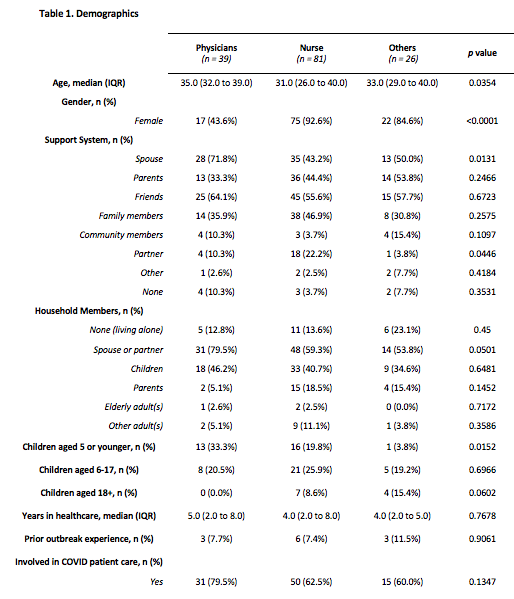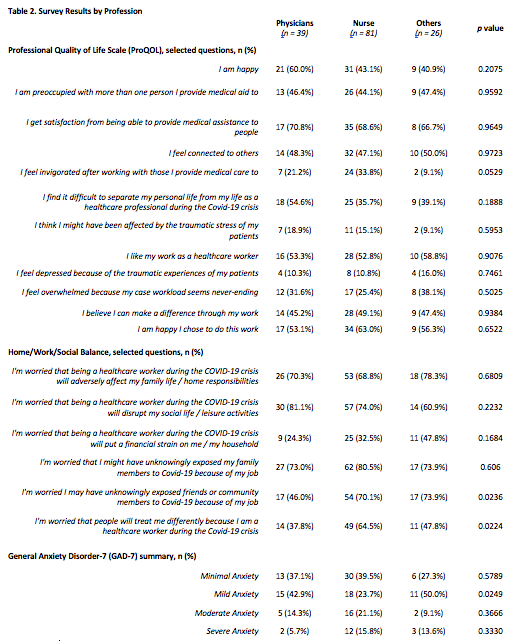Background: With nearly 60 million cases and 1.4 million deaths globally (1), the COVID-19 pandemic has been deemed a traumatic event that transcends the range of normal human experience (2). History suggests those on the frontline of disasters are at risk of burnout, depression, post- traumatic stress disorder, and in grim cases—suicide. (3) The current body of research further demonstrates a heightened risk of trauma related stress in health care workers that is greatest for those on the frontline (4) but the degree to which various factors impact the level of anxiety has not yet been described. Accordingly, we sought to understand the experience of how frontline workers are differentially affected by events such as the COVID-19 crisis.
Methods: Between July 17, 2020 and October 31, 2020, we surveyed nurses, physicians, advanced practice providers and respiratory therapists at a large urban, academic, safety net hospital. Survey questions were adapted from validated questionnaires used to determine quality of life (PROQOL) and assess levels of anxiety (GAD-7). Additional survey questions assessed individuals’ anxiety related to domains of work, home and social lives. Study subjects were stratified by profession: physicians, nurses, and others. Means, medians, and standard deviations were reported for continuous variables. Categorical variables were described by obtaining frequency distributions. Kruskal-Wallis tests and Chi Square tests of equal proportions were used to assess for differences in survey responses and demographics among the profession. P- values <0.05 were considered significant.
Results: Respondents included 39 physicians, 81 nurses and 26 advanced practice providers and respiratory therapists (other) (Table1). Across all professions, 70.8% felt adversely affected in their family life, 73.7% felt disruption in social life/ leisure activities, and 32.8% worried about financial strain. While a majority of nurses and advanced practice providers and respiratory therapists endorsed worries of being excluded from social gatherings / activities due to their profession, it was a minority of physicians expressed similar worries (59.7% v 63.6% v 35.1%, p=0.0283). Similarly, where 70.1% of nurses and 73.9% APPs were significantly concerned over unknowingly exposing friends or community members to COVID, 46% of physicians shared those sentiments (p=0.0224). Nurses were more worried about being treated differently by others when compared to physicians and others (64.5% v 37.8% v 47.8%, p= 0.0236). While 30.1% of respondents experienced moderate or severe anxiety, we found no difference in general anxiety between professions or impact on quality of life (Table 2).
Conclusions: As in prior disasters, those on the frontline of COVID-19 as healthcare workers, regardless of profession, report increased anxiety that extends beyond the hospital to their home and social lives, with some differences in the domains and source of anxiety between professional cadres. Models of the epidemiology of COVID-19 predict that the pandemic’s impact will continue through 2021(5); therefore, longitudinal monitoring of health care worker emotional wellbeing is indicated. A recent article called for enhanced organizational resources to aid clinicians so they can continue caring for the sick (6). The results of this survey buttress this call for provision of resources, potentially tailored by profession, for support of health workers and suggest targets for mitigation.


